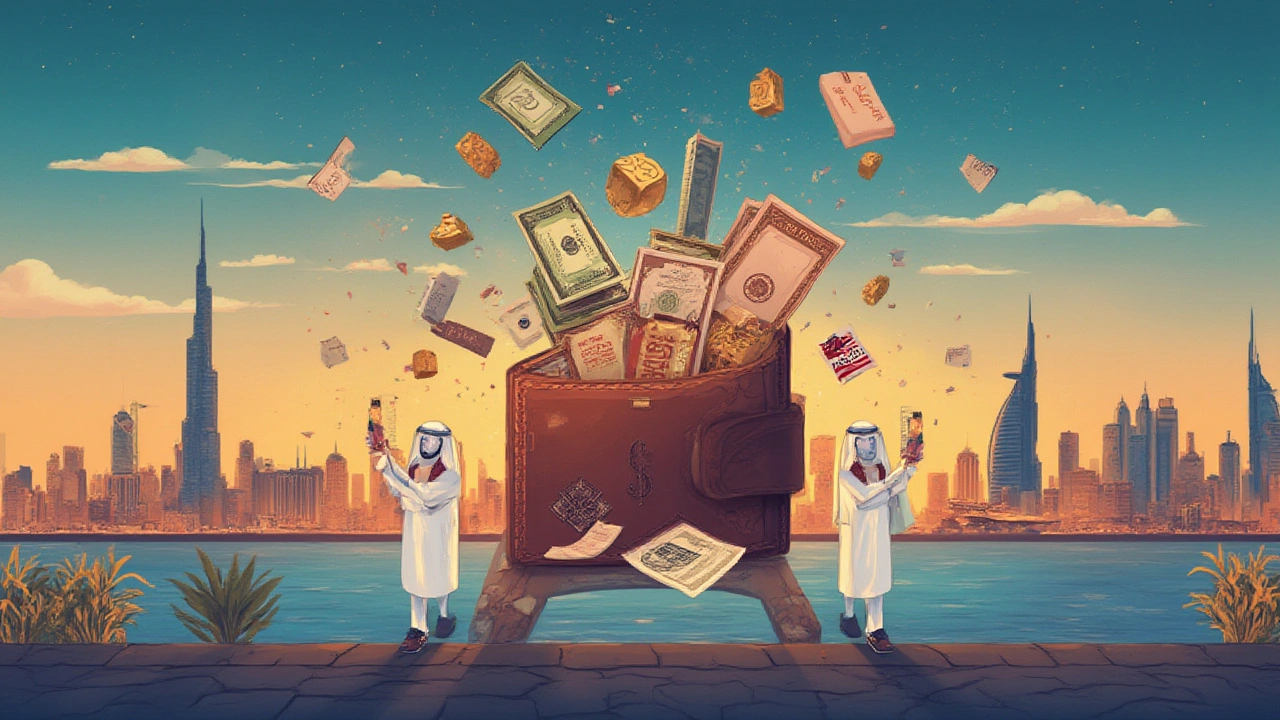
Throw out everything you’ve been told about Dubai’s glitz and how “you just have to see it.” The real question Americans want answered: will Dubai devour your dollars faster than you can blink, or is it surprisingly doable on your budget? This city, known for $25 gold-flaked cappuccinos and wild shopping malls with actual ski slopes, loves its luxury reputation. But peel back the curtain, and you’ll spot a city with layers—some shining bright, some way more down-to-earth. Let’s crack open the details about money in Dubai and what Americans can actually expect to pay—whether you’re just visiting, planning to move, or daydreaming from your couch.
The True Cost of a Trip to Dubai: Hotels, Flights, and Day-to-Day Spending
Start with flights. From major U.S. cities like New York or Los Angeles, Dubai isn’t just a short hop—it’s almost 7,000 miles away. As of July 2025, roundtrip airfare fluctuates from $700 for the thrifty who hunt for deals, to $1,300 or more if you want direct flights with extra legroom or a touch of pampering. Off-peak travel (think September or early May) can shave off several hundred bucks compared to winter’s holiday surge, when everyone’s trying to escape the cold.
Now, hotels. Dubai is famous for seven-star showpieces like the Burj Al Arab, and you could drop $1,500 a night if you crave that. But honestly, a regular 4-star hotel can hover around $110–$220 per night depending on location and timing. Want to save more? Comfortable Airbnb apartments in safe neighborhoods can go for under $90 a night. Summer heat means lower hotel prices, but the trade-off? You’ll stick to air-conditioned adventures.
Dining can jump from one extreme to the other. Want to go big? Dinner with cocktails at a sky-high rooftop can cost $120 per person, easy. But you’ll also find amazing hole-in-the-wall Indian or Lebanese joints where a full meal is under $12, with fresh, mind-blowing flavors. If you stick to popular Western chains, expect to pay close to U.S. prices, maybe a bit higher after tax and a 10% service charge.
Transportation is where you catch a break. Dubai’s Metro is clean, safe, efficient, and super cheap. A single ride can be $1.50–$2.00. Taxis are everywhere, metered, and honest (rare for big tourist cities). Trips across town rarely cost more than $12. Uber and Careem (the local alternative) are just as easy to use as back home, with prices about on par or slightly less than U.S. rates.
So, day-to-day, can an American on a real-world budget get by? Yes—if you resist daily luxury splurges, watch your bar tab, and occasionally trade steak dinners for shawarma wraps. For an average American traveler, budget $120–$180 per day for hotels, meals, some activities, and transportation—not counting flights or shopping sprees. Spend smartly, and you’ll have plenty left for a wild day at the Atlantis Aquaventure or that Burj Khalifa selfie.
| Expense | Budget | Mid-Range | Luxury |
|---|---|---|---|
| Accommodation (per night) | $50–$100 | $120–$250 | $450+ |
| Meals (per day) | $15–$30 | $45–$110 | $180+ |
| Transportation | $5–$10 | $12–$25 | $60+ |
| Attractions | $15–$30 | $45–$80 | $120+ |
Hidden Expenses: Alcohol, Entertainment, and What Surprises Most Americans
Here’s where Dubai shakes things up. First off, alcohol isn’t available at regular grocery stores, supermarkets, or public spaces. You can only find booze at hotels, bars, and a few licensed restaurants. A cocktail at a luxury lounge? Prepare to drop $22 or more. Even a casual beer at the hotel bar usually costs at least $12. Dubai’s endless brunches, those legendary three-hour affairs with buffet lines overflowing, might sound worth a splurge—except they regularly cost $85–$120, drinks included. Fun, but definitely not cheap thrills.
Now, want to party like a local? Nightclubs sometimes have a cover charge ($20–$40), especially if there’s a DJ or live music. Guys often pay more than girls. Don’t expect happy hour prices everywhere. Some expats avoid the big clubs and opt for "ladies’ nights" (they exist every night of the week somewhere in Dubai!) where women get free drinks after 8 p.m. That’s a practical tip, not just marketing. Check places like Soho Garden, WHITE, or Atelier M for deals—women literally drink free at certain times, while men pay full price.
Public beaches are free, but want private beach access—maybe with a pool or daybed? Plan on $40–$85 per person at hotels like Atlantis, Jumeirah Beach, or the elegant Nikki Beach. Indoor activities like theme parks, desert safaris, and the famous Dubai Frame also add up, usually costing $35–$80 per piece. Even a ride to the 148th floor of Burj Khalifa can set you back $110. It’s a heck of a view, but wow, your wallet feels lighter on the way down.
Dubai has a 5% sales tax (called VAT), slapped onto most purchases, including hotel bills and restaurant tabs. It’s usually included but worth checking. Tipping isn’t required but is always appreciated—most people tip 5–10% for taxis and food delivery, 10–15% at restaurants.
- Water is safe and free at many restaurants, but if you order bottled water (and you will), it’s always marked up. A bottle at the mall is around $2; in a club, $7. Stay hydrated without racking up charges by planning ahead.
- Public toilets are spotless—and almost always free, except sometimes in malls, where you might pay a few cents for a fancy powder room.
If you want to stock up on spirits or wine, there’s a liquor license for residents (tourists get a different system now), but buying directly is more complicated—and less worth the hassle for short stays. Bottom line: drinking and clubbing will wreck your budget faster than any other Dubai activity.

Living in Dubai: What Expats Actually Pay for Rent, Groceries, and a Fun Life
So, what if you’re not just passing through but thinking of making Dubai your home? A lot of Americans have made the leap, lured by tax-free salaries and palm-lined beaches. It looks fabulous in Instagram reels, and honestly parts of it live up to the hype—but there are some real surprises when it comes to monthly bills.
Rent is the big beast. City center apartments, like Dubai Marina or Downtown, usually eat up the fattest piece of everyone’s paycheck. In 2025, a modern one-bedroom in a good neighborhood averages $2,050 per month unfurnished. Move further out, or choose older buildings, and you can cut that down to $1,350–$1,600. Want all the trimmings—pool, gym, sea view? Easy: $3,300 and up, not including utilities or internet (another $200–$300/month).
Landlords commonly want rent upfront: every three, six, or twelve months. Many Americans find that a total shock. Short-term options are out there but cost much more. If you’re moving for work, try getting your employer to subsidize housing or help arrange contracts. A solid relocation package makes or breaks your comfort level here.
Groceries run a little higher than average U.S. prices, depending on what you crave. Local fruits, veggies, and imported basics (rice, chicken) are reasonable. But U.S. brands—think peanut butter, Ben & Jerry’s, American cereals—are heavily taxed and marked up. Milk is around $2.80 per gallon, bread $2, eggs $3. For a week’s food shop to cook at home, aim for $80–$130 for a single person, more if you insist on imported snacks and specialty items.
- Fast food is everywhere—with McDonald’s, KFC, Shake Shack, and Chipotle-style places charging about 30% more than their U.S. price tag.
- Local restaurants, especially South Asian and Arabic, serve big portions cheap: $7 for chicken biryani, $3 for fresh naan bread, $10 for a huge falafel platter.
Utilities can sting in summer, thanks to wild air-conditioning bills. Electricity can jump to $150 or more when it’s 110°F outside every day. The good news: water and high-speed fiber internet are bundled and fast, usually about $50–$100 monthly depending on your usage and building.
Schooling for kids in Dubai is pricey and mostly private; $8,000–$25,000 per year is not unusual. But the upside: top-rated international schools, plenty of languages, and fat curriculum choices compared to the U.S.
But here’s the real kicker—salaries are usually tax-free for foreign workers, which makes those high rents and splurges seem a bit less scary. Health insurance is mandatory (usually paid by your job), with private clinics offering fast, high-end services. Takeaway: Dubai expects you to spend, but also rewards ambition and hustle.
How to Make Your Dollar Go Further: Money-Saving Tips for Americans in Dubai
Dubai doesn’t have to be a millionaire’s playground. Plenty of Americans—especially savvy travelers and smart expats—score sweet deals and stretch their money further. Here are tricks locals (and regulars) actually use:
- Happy Hours and Ladies’ Nights: Look for daily drinks deals, especially Sunday–Wednesday. Grab apps like The Entertainer for buy-one-get-one restaurant and nightlife coupons.
- Public Transport: The Metro is cool, easy, and covers the main city hotspots. Buses cost even less. Taxis are fair but walk or use Metro to avoid sitting in traffic during rush hour (4:30–7:30 PM is mayhem).
- Avoid Tourist Traps: Skip huge malls if you’re not planning to shop; boutique souks and smaller neighborhoods like Al Fahidi have more character—and little shops for way better prices.
- Local SIM Cards: Ditch expensive international roaming. Local carriers like Du and Etisalat offer tourist packages for $20–$30 per month with plenty of data and calls. Free public Wi-Fi pops up almost everywhere, including on the Metro.
- Groceries: Stock up at Carrefour or Lulu Hypermarket and try local brands instead of American imports. Farmers markets and Friday souks sell fruit and fish for a steal.
- Off-Season Hotel Rates: Visit between mid-June and September for the best hotel and apartment deals. It’s flaming hot—so plan for pool time, malls, and late-night activities.
- Free Stuff: Most major beaches, desert areas, and parks are free. Many top attractions have a free-entry night each week, if you know where to look. The Dubai Fountain show at Burj Khalifa is totally free and runs several times nightly—an epic photo spot you won’t pay a dirham for.
Watch out for hidden ATM fees—ask your bank about partner networks before you leave the U.S. Credit cards are accepted everywhere, but chip-and-pin is the norm. For bigger purchases (rent, furniture), bank transfers or local apps like Payit are common.
The magic formula is mixing up luxury splurges with local-only experiences: treat yourself once with a sunset helicopter ride, but balance it out with beach days or a cheap, gorgeous lunch at Ravi’s in Satwa. The most memorable moments in Dubai aren’t the ones you drop $500 on—they’re the ones you stumble into for free.

What to Expect: Dubai vs U.S. Prices Side-by-Side
Most Americans are stunned that Dubai’s public safety is almost off the charts—Uber drivers don’t try to hustle you, street crime is low, and you can walk at 2 a.m. without a second thought. But sticker shock happens in odd places—like at the mall, if you’re shopping for American clothes.
| Item | Dubai | U.S. |
|---|---|---|
| Big Mac Meal | $9.50 | $7.69 |
| Bottle of wine (shop) | $18 | $11 |
| Coffee (Starbucks) | $5.60 | $4.80 |
| Gym membership | $130/mo | $58/mo |
| Monthly Metro pass | $81 | $102 (NYC) |
| Electricity (1BR apartment) | $95–$180 | $85–$125 |
| Pint of beer (bar) | $12 | $8 |
| Designer jeans (Levi's) | $68 | $53 |
| Liter of regular milk | $2.80 | $0.98 |
The biggest outlier is alcohol (thanks to heavy taxes) and imported consumer goods (jeans, electronics, American comfort snacks). But the Dubai cost picture flips with no income tax, tons of free amenities, safe neighborhoods, and constantly improving infrastructure.
Dubai loves its luxury reputation, but locals, visitors—and lots of us Americans—quickly figure out how to dodge price traps and discover the city’s real deals. Whether you’re spending big or stretching every dollar, you’re in for an adventure that’s as wild, weird, and surprisingly affordable as you make it.
Dubai Escort